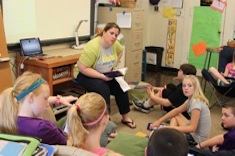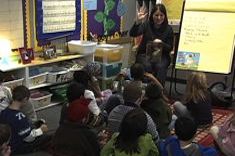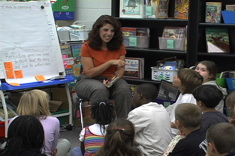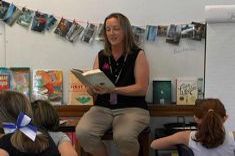Recently, I met with a group of middle school students, hoping to get some input to help me plan a professional-development class for teachers. When I first met them, I had to get them to relax and trust me—they were typically “adolescent” at the beginning, showing hesitancy and disdain at my very existence. But a few ridiculous jokes and some time spent letting them talk about themselves—middle schoolers love both—was enough to wear them down. I felt them loosen and come on over to my side, and I knew I could get them to help me.
“Okay, everyone. Now it’s time to get to work.” I handed them each a 5-by-7-inch index card. “I’d like you to write a couple of paragraphs about what you remember to be your very favorite part of elementary school. The thing you miss most.”
I heard someone let out a deep sigh. “Recess,” he said.
The rest of the group murmured in gloomy agreement, collectively lamenting the fact that recess was gone from their lives forever.
“I’m really sorry about recess,” I told them, unable to suppress a smile. “That really does stink. But I was wondering more about the school part. The learning.”
After thinking a while, they began to write. Their heads were bent over their desks as they wrote silently, and their hands moved across their cards with fierce intensity and focus, a sharp contrast from the uncertainty they’d shown me when I first started working with them. I couldn’t wait to read their thoughts.
Later, as I flipped through their cards, I was taken aback by how many of them had written about the same thing. Time and again, the students remarked upon how much they’d loved their elementary school teachers reading aloud to them.
I told that to a group of teachers after school one day. “Does that surprise you?” I asked.
“Not at all,” one of them answered.
“My kids love read aloud,” another said. “I think it’s their favorite part of the day. They get to just sit back, relax, and listen to someone read a story. What’s more fun than that?”
A third teacher laughed. “But it’s not just someone,” she said. “Students want their teacher to do the read aloud. I’ll never forget the time I had to be absent for a couple of days, and when I got back, my kids asked me to go back and reread the sections the substitute had read aloud because they hated how she’d read to them. They even asked me if I would take the read aloud out of my lesson plans on days I have to be absent. They told me, ‘No one does it like you. Substitutes always mess it up.’"
All the teachers in the room agreed. It seemed unanimous: students love it when their teachers read aloud to them.
I thought I knew why this was such a beloved part of being an elementary student, but I didn’t want to assume anything. So I went back and asked the middle school students why it was so important. Their answers varied quite a bit, but they all waxed nostalgic over read aloud:
- “I liked the part of the day where I didn’t have to think—I just had to listen.”
- “My teachers used a lot of different voices and sounds for different characters. It was like watching a movie.”
- “There was never a test for read aloud. There were tests for everything else, but not read aloud. I got to relax and just let my mind wander.”
- “When my teacher would read a whole series, I couldn’t wait to hear what happened in each ‘next’ book.”
- “Having the teacher’s voice read the stories made them seem real and easy to connect to the characters.”
- “I always felt like my teacher was really enjoying himself during read aloud. It made him happy, which made me happy.”
- “I had a teacher that let us sprawl all around the room wherever we wanted. I liked that freedom. Sometimes, to reward us for doing good work, she’d pick a Friday and let us bring pillows and wear our jammies to school, and she read practically all day. Those were absolutely my very favorite days of all of elementary school.”
- “We don’t have regular read aloud in middle school—our teacher only reads to us every now and then. I really miss it, because it helped me feel closer to my teacher to have her read a story every single day at the exact same time. It got to be something I counted on and looked forward to. We don’t have that anymore.”
And, from one particularly succinct student:
- “I JUST LOVED IT. I DON’T EVEN KNOW WHY. BRING BACK READ ALOUD!!!!!!!!!!!!!!!”
There were countless other reasons these students remembered and loved read aloud so much. All of their words spoke of loving how teachers let them choose books or series that the whole class loved; how their teachers read with inflection and voice; the regularity and promise of the regular read-aloud block; and the escape from the other, more difficult schoolwork for which they were held accountable.
Reading their thoughts—profound, smart, and mature as they were—I couldn’t help but join them in mourning the loss of regular read aloud when moving on from elementary school. I get it. Middle or high school teachers are constantly pressed for time and anxious about getting all the content covered each day. But just like the loss of recess, “growing up” as students can sometimes really be a bummer. If I’m ever president of the world, read aloud is going to be mandatory for all students—and maybe all adults, too.









